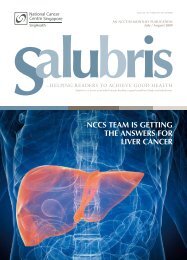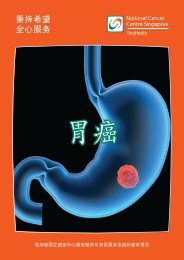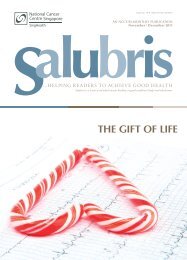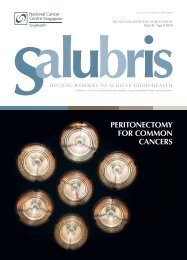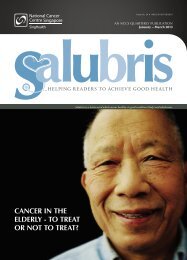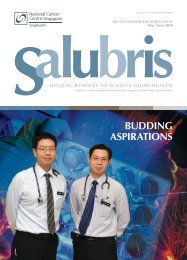Medical Professionals Version - National Cancer Centre Singapore
Medical Professionals Version - National Cancer Centre Singapore
Medical Professionals Version - National Cancer Centre Singapore
Create successful ePaper yourself
Turn your PDF publications into a flip-book with our unique Google optimized e-Paper software.
WHERE DID YOUR<br />
FINGERPRINTS GO?<br />
PAGE A7<br />
People<br />
SALUBRIS<br />
July / August 2009<br />
Most of us assume that our fingerprints are<br />
permanent and unique. One can hardly<br />
dispute this, considering that fingerprints<br />
have always been regarded as the most<br />
reliable method of identification.<br />
Hence, the government agencies<br />
would seek your fingerprint if<br />
you want to apply for an identity<br />
card, or a passport. Those who are<br />
illiterate can use their fingerprint to open<br />
a bank account. Not only that, convicted<br />
criminals are fingerprinted so that they can<br />
be tracked down for any future offences.<br />
For most of us, the fingerprint is like our<br />
shadow. It goes with you wherever you are.<br />
But this was not to be for an Indonesian<br />
travelling abroad to visit his relatives.<br />
Mr S (as he chose to remain anonymous)<br />
turned up at a United States airport with<br />
no fingerprints when the border security<br />
checked him to verify his identity.<br />
The 62-year-old was detained for four hours<br />
as he tried to explain his predicament.<br />
Eventually he was released when the<br />
authorities determined that he was not a<br />
security threat.<br />
Where did Mr S’s fingerprints go? His<br />
doctor, Senior Consultant Dr Tan Eng<br />
Huat of the Department of <strong>Medical</strong><br />
Oncology, <strong>National</strong> <strong>Cancer</strong> <strong>Centre</strong><br />
<strong>Singapore</strong>, shed light on this mystery.<br />
For more than three years, Mr S,<br />
who was diagnosed with Metastatic<br />
Nasopharyngeal Carcinoma, has been<br />
on a course of orally-administered<br />
cytotoxic drug Capecitabine. The drug,<br />
also known as Xeloda, is commonly<br />
used for the treatment of metastatic<br />
breast cancer and cancers of the colon,<br />
head and neck and stomach.<br />
The drug spawns some dermatological<br />
damages such as blistering on the<br />
hand and foot in up to 40 per cent of<br />
the patients. More severe side effects<br />
include peeling and bleeding on palms<br />
and soles of feet. Over time, their<br />
fingerprints vanish.<br />
But this does not mean that patients<br />
should refrain from travelling abroad.<br />
Dr Tan has a simple remedy that will<br />
ease some of the inconveniences<br />
they would experience with security<br />
authorities: carry a doctor’s letter on<br />
oneself at all times, especially when<br />
they are travelling.<br />
The spin-off for the whole saga however<br />
saw Dr Tan and his colleague Dr Choo<br />
Su Pin in the centre of a media storm<br />
when the news was reported in the<br />
Annals of Oncology, a monthly journal<br />
published on behalf of the European<br />
Society for <strong>Medical</strong> Oncology.<br />
From Colombia to the UK and<br />
Europe, the world’s news media<br />
hounded the two doctors for a story<br />
for more than a week.<br />
By Carol Ang<br />
PROMOTIONS<br />
NAME<br />
Dr Yap Swee Peng<br />
Dr Lim Soon Thye<br />
Dr Toh Chee Keong<br />
Dr Tham Chee Kian<br />
TITLE<br />
Radiation Oncology, Acting Director,<br />
Public & Patient Education<br />
Deputy Head, <strong>Medical</strong> Oncology<br />
Senior Consultant, <strong>Medical</strong> Oncology<br />
Associate Consultant, <strong>Medical</strong> Oncology



